Identifying Research Methodologies: Rainfall, Wetness, and Hydrology
VerifiedAdded on 2020/12/30
|10
|2460
|111
Report
AI Summary
This report provides a reflection on research methodologies relevant to the study of rainfall conditions, antecedent wetness, and their impact on engineering hydrology. The author analyzes two case studies to identify the research methodologies employed, emphasizing the importance of the research methodology section. The report proposes a secondary data collection method due to its efficiency and cost-effectiveness, and highlights the advantages of quantitative research methods, specifically the use of numerical and statistical data. The proposed methodology includes steps for data collection, research methods (quantitative), and the research process, which involves defining the research problem, reviewing literature, formulating a hypothesis, selecting a research design, carrying out the research, interpreting outcomes, and reporting findings. The conclusion underscores the significance of a well-defined research methodology for achieving accurate and reliable results in the study of hydrology.
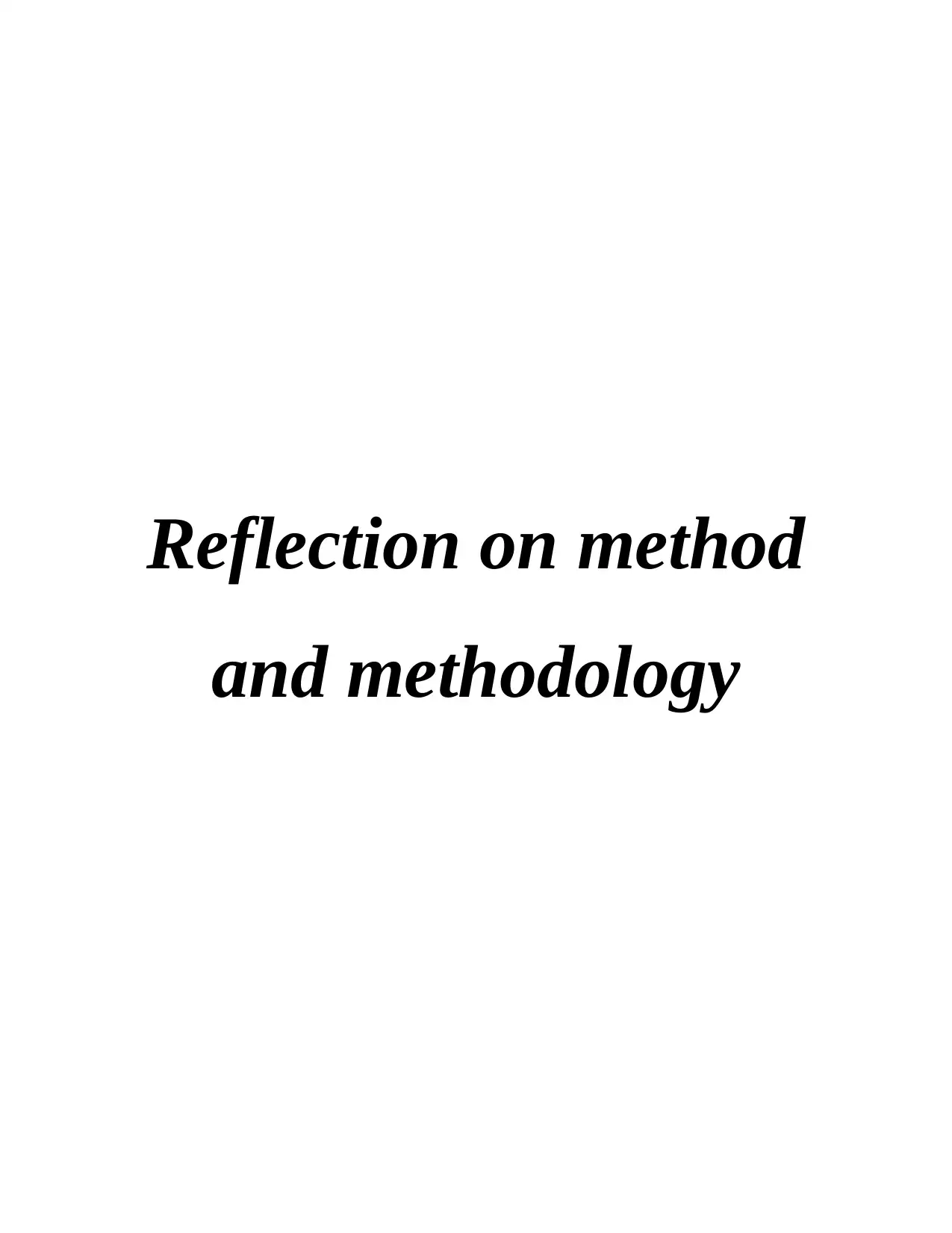
Reflection on method
and methodology
and methodology
Paraphrase This Document
Need a fresh take? Get an instant paraphrase of this document with our AI Paraphraser
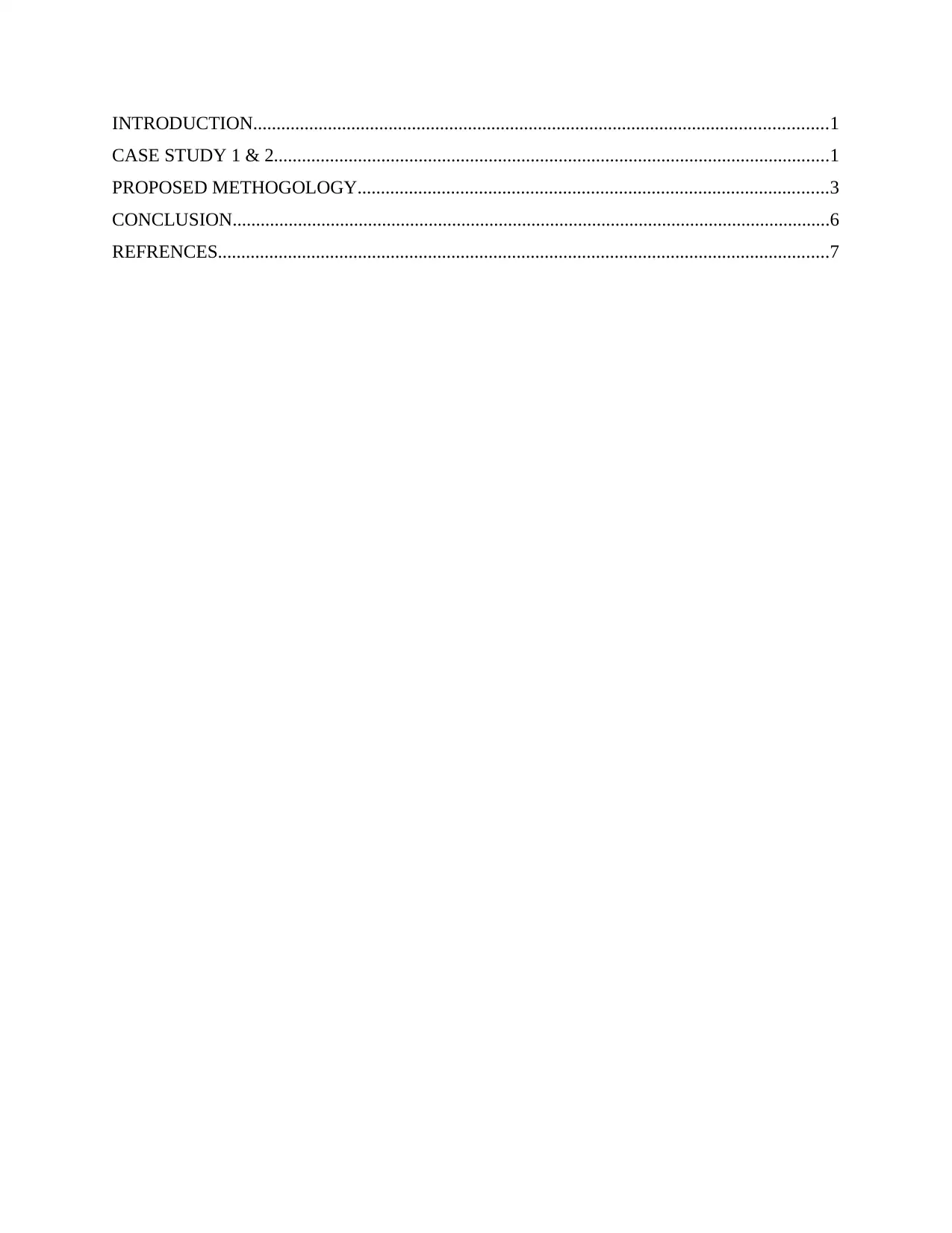
INTRODUCTION...........................................................................................................................1
CASE STUDY 1 & 2.......................................................................................................................1
PROPOSED METHOGOLOGY.....................................................................................................3
CONCLUSION................................................................................................................................6
REFRENCES...................................................................................................................................7
CASE STUDY 1 & 2.......................................................................................................................1
PROPOSED METHOGOLOGY.....................................................................................................3
CONCLUSION................................................................................................................................6
REFRENCES...................................................................................................................................7

⊘ This is a preview!⊘
Do you want full access?
Subscribe today to unlock all pages.

Trusted by 1+ million students worldwide
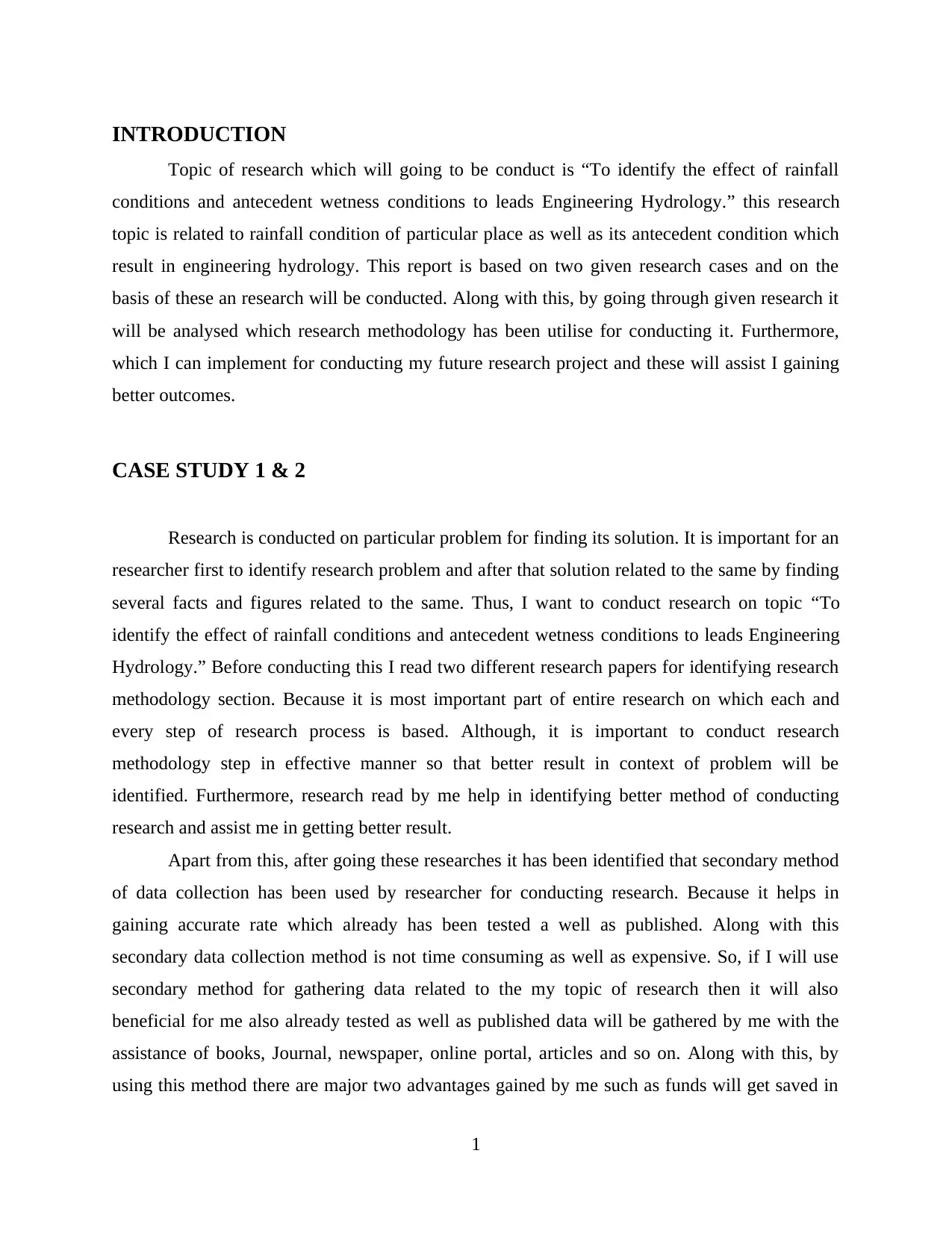
INTRODUCTION
Topic of research which will going to be conduct is “To identify the effect of rainfall
conditions and antecedent wetness conditions to leads Engineering Hydrology.” this research
topic is related to rainfall condition of particular place as well as its antecedent condition which
result in engineering hydrology. This report is based on two given research cases and on the
basis of these an research will be conducted. Along with this, by going through given research it
will be analysed which research methodology has been utilise for conducting it. Furthermore,
which I can implement for conducting my future research project and these will assist I gaining
better outcomes.
CASE STUDY 1 & 2
Research is conducted on particular problem for finding its solution. It is important for an
researcher first to identify research problem and after that solution related to the same by finding
several facts and figures related to the same. Thus, I want to conduct research on topic “To
identify the effect of rainfall conditions and antecedent wetness conditions to leads Engineering
Hydrology.” Before conducting this I read two different research papers for identifying research
methodology section. Because it is most important part of entire research on which each and
every step of research process is based. Although, it is important to conduct research
methodology step in effective manner so that better result in context of problem will be
identified. Furthermore, research read by me help in identifying better method of conducting
research and assist me in getting better result.
Apart from this, after going these researches it has been identified that secondary method
of data collection has been used by researcher for conducting research. Because it helps in
gaining accurate rate which already has been tested a well as published. Along with this
secondary data collection method is not time consuming as well as expensive. So, if I will use
secondary method for gathering data related to the my topic of research then it will also
beneficial for me also already tested as well as published data will be gathered by me with the
assistance of books, Journal, newspaper, online portal, articles and so on. Along with this, by
using this method there are major two advantages gained by me such as funds will get saved in
1
Topic of research which will going to be conduct is “To identify the effect of rainfall
conditions and antecedent wetness conditions to leads Engineering Hydrology.” this research
topic is related to rainfall condition of particular place as well as its antecedent condition which
result in engineering hydrology. This report is based on two given research cases and on the
basis of these an research will be conducted. Along with this, by going through given research it
will be analysed which research methodology has been utilise for conducting it. Furthermore,
which I can implement for conducting my future research project and these will assist I gaining
better outcomes.
CASE STUDY 1 & 2
Research is conducted on particular problem for finding its solution. It is important for an
researcher first to identify research problem and after that solution related to the same by finding
several facts and figures related to the same. Thus, I want to conduct research on topic “To
identify the effect of rainfall conditions and antecedent wetness conditions to leads Engineering
Hydrology.” Before conducting this I read two different research papers for identifying research
methodology section. Because it is most important part of entire research on which each and
every step of research process is based. Although, it is important to conduct research
methodology step in effective manner so that better result in context of problem will be
identified. Furthermore, research read by me help in identifying better method of conducting
research and assist me in getting better result.
Apart from this, after going these researches it has been identified that secondary method
of data collection has been used by researcher for conducting research. Because it helps in
gaining accurate rate which already has been tested a well as published. Along with this
secondary data collection method is not time consuming as well as expensive. So, if I will use
secondary method for gathering data related to the my topic of research then it will also
beneficial for me also already tested as well as published data will be gathered by me with the
assistance of books, Journal, newspaper, online portal, articles and so on. Along with this, by
using this method there are major two advantages gained by me such as funds will get saved in
1
Paraphrase This Document
Need a fresh take? Get an instant paraphrase of this document with our AI Paraphraser
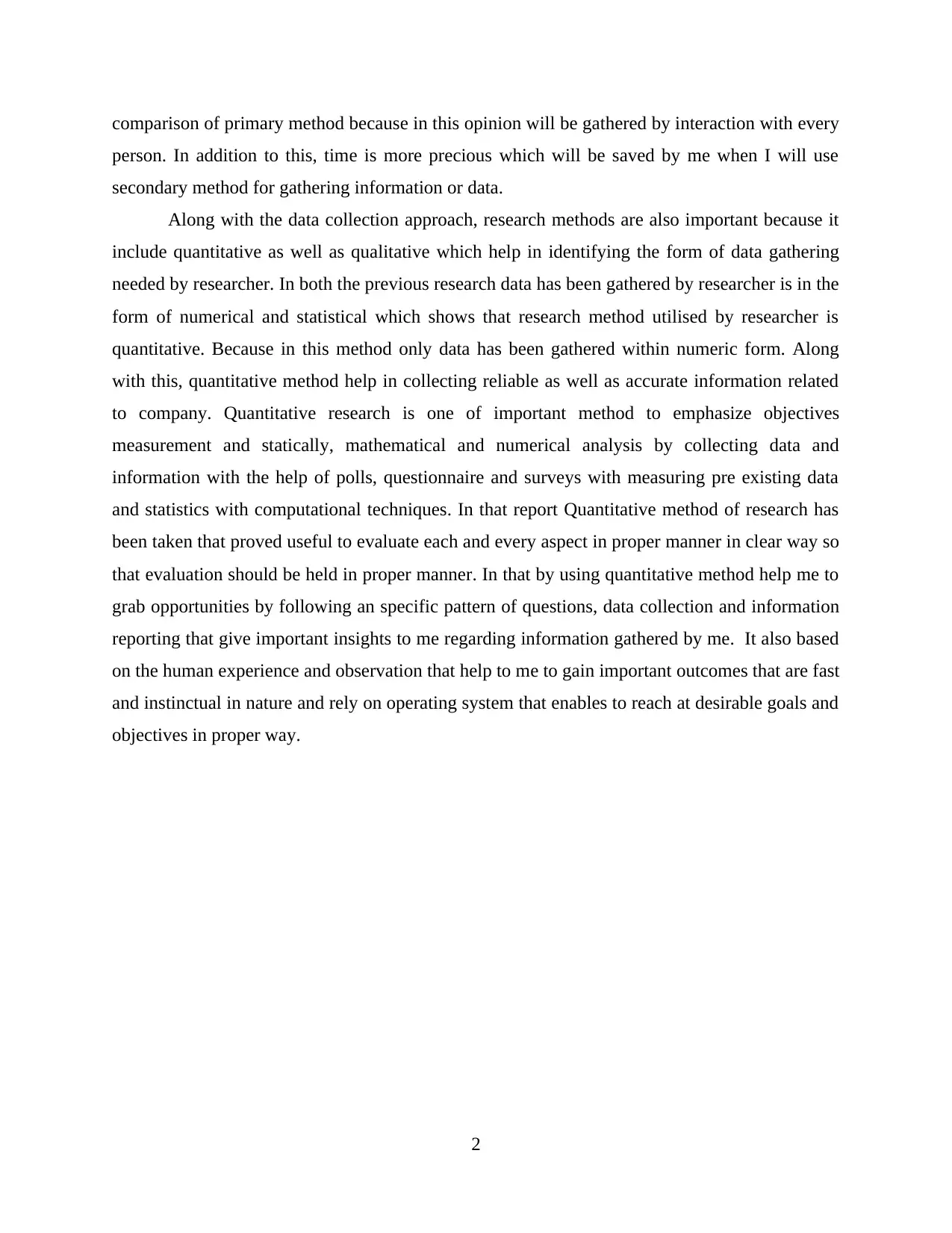
comparison of primary method because in this opinion will be gathered by interaction with every
person. In addition to this, time is more precious which will be saved by me when I will use
secondary method for gathering information or data.
Along with the data collection approach, research methods are also important because it
include quantitative as well as qualitative which help in identifying the form of data gathering
needed by researcher. In both the previous research data has been gathered by researcher is in the
form of numerical and statistical which shows that research method utilised by researcher is
quantitative. Because in this method only data has been gathered within numeric form. Along
with this, quantitative method help in collecting reliable as well as accurate information related
to company. Quantitative research is one of important method to emphasize objectives
measurement and statically, mathematical and numerical analysis by collecting data and
information with the help of polls, questionnaire and surveys with measuring pre existing data
and statistics with computational techniques. In that report Quantitative method of research has
been taken that proved useful to evaluate each and every aspect in proper manner in clear way so
that evaluation should be held in proper manner. In that by using quantitative method help me to
grab opportunities by following an specific pattern of questions, data collection and information
reporting that give important insights to me regarding information gathered by me. It also based
on the human experience and observation that help to me to gain important outcomes that are fast
and instinctual in nature and rely on operating system that enables to reach at desirable goals and
objectives in proper way.
2
person. In addition to this, time is more precious which will be saved by me when I will use
secondary method for gathering information or data.
Along with the data collection approach, research methods are also important because it
include quantitative as well as qualitative which help in identifying the form of data gathering
needed by researcher. In both the previous research data has been gathered by researcher is in the
form of numerical and statistical which shows that research method utilised by researcher is
quantitative. Because in this method only data has been gathered within numeric form. Along
with this, quantitative method help in collecting reliable as well as accurate information related
to company. Quantitative research is one of important method to emphasize objectives
measurement and statically, mathematical and numerical analysis by collecting data and
information with the help of polls, questionnaire and surveys with measuring pre existing data
and statistics with computational techniques. In that report Quantitative method of research has
been taken that proved useful to evaluate each and every aspect in proper manner in clear way so
that evaluation should be held in proper manner. In that by using quantitative method help me to
grab opportunities by following an specific pattern of questions, data collection and information
reporting that give important insights to me regarding information gathered by me. It also based
on the human experience and observation that help to me to gain important outcomes that are fast
and instinctual in nature and rely on operating system that enables to reach at desirable goals and
objectives in proper way.
2
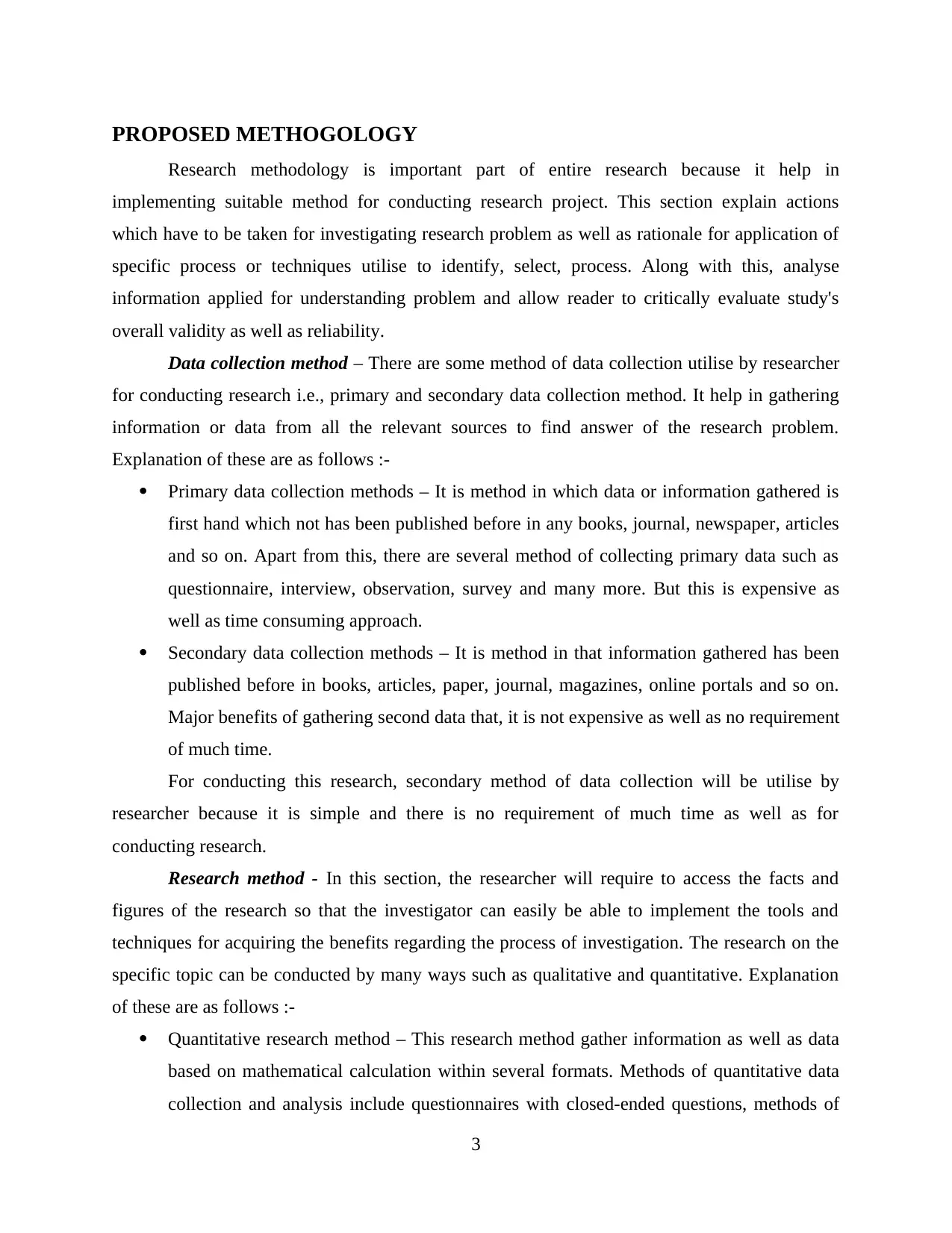
PROPOSED METHOGOLOGY
Research methodology is important part of entire research because it help in
implementing suitable method for conducting research project. This section explain actions
which have to be taken for investigating research problem as well as rationale for application of
specific process or techniques utilise to identify, select, process. Along with this, analyse
information applied for understanding problem and allow reader to critically evaluate study's
overall validity as well as reliability.
Data collection method – There are some method of data collection utilise by researcher
for conducting research i.e., primary and secondary data collection method. It help in gathering
information or data from all the relevant sources to find answer of the research problem.
Explanation of these are as follows :-
Primary data collection methods – It is method in which data or information gathered is
first hand which not has been published before in any books, journal, newspaper, articles
and so on. Apart from this, there are several method of collecting primary data such as
questionnaire, interview, observation, survey and many more. But this is expensive as
well as time consuming approach.
Secondary data collection methods – It is method in that information gathered has been
published before in books, articles, paper, journal, magazines, online portals and so on.
Major benefits of gathering second data that, it is not expensive as well as no requirement
of much time.
For conducting this research, secondary method of data collection will be utilise by
researcher because it is simple and there is no requirement of much time as well as for
conducting research.
Research method - In this section, the researcher will require to access the facts and
figures of the research so that the investigator can easily be able to implement the tools and
techniques for acquiring the benefits regarding the process of investigation. The research on the
specific topic can be conducted by many ways such as qualitative and quantitative. Explanation
of these are as follows :-
Quantitative research method – This research method gather information as well as data
based on mathematical calculation within several formats. Methods of quantitative data
collection and analysis include questionnaires with closed-ended questions, methods of
3
Research methodology is important part of entire research because it help in
implementing suitable method for conducting research project. This section explain actions
which have to be taken for investigating research problem as well as rationale for application of
specific process or techniques utilise to identify, select, process. Along with this, analyse
information applied for understanding problem and allow reader to critically evaluate study's
overall validity as well as reliability.
Data collection method – There are some method of data collection utilise by researcher
for conducting research i.e., primary and secondary data collection method. It help in gathering
information or data from all the relevant sources to find answer of the research problem.
Explanation of these are as follows :-
Primary data collection methods – It is method in which data or information gathered is
first hand which not has been published before in any books, journal, newspaper, articles
and so on. Apart from this, there are several method of collecting primary data such as
questionnaire, interview, observation, survey and many more. But this is expensive as
well as time consuming approach.
Secondary data collection methods – It is method in that information gathered has been
published before in books, articles, paper, journal, magazines, online portals and so on.
Major benefits of gathering second data that, it is not expensive as well as no requirement
of much time.
For conducting this research, secondary method of data collection will be utilise by
researcher because it is simple and there is no requirement of much time as well as for
conducting research.
Research method - In this section, the researcher will require to access the facts and
figures of the research so that the investigator can easily be able to implement the tools and
techniques for acquiring the benefits regarding the process of investigation. The research on the
specific topic can be conducted by many ways such as qualitative and quantitative. Explanation
of these are as follows :-
Quantitative research method – This research method gather information as well as data
based on mathematical calculation within several formats. Methods of quantitative data
collection and analysis include questionnaires with closed-ended questions, methods of
3
⊘ This is a preview!⊘
Do you want full access?
Subscribe today to unlock all pages.

Trusted by 1+ million students worldwide
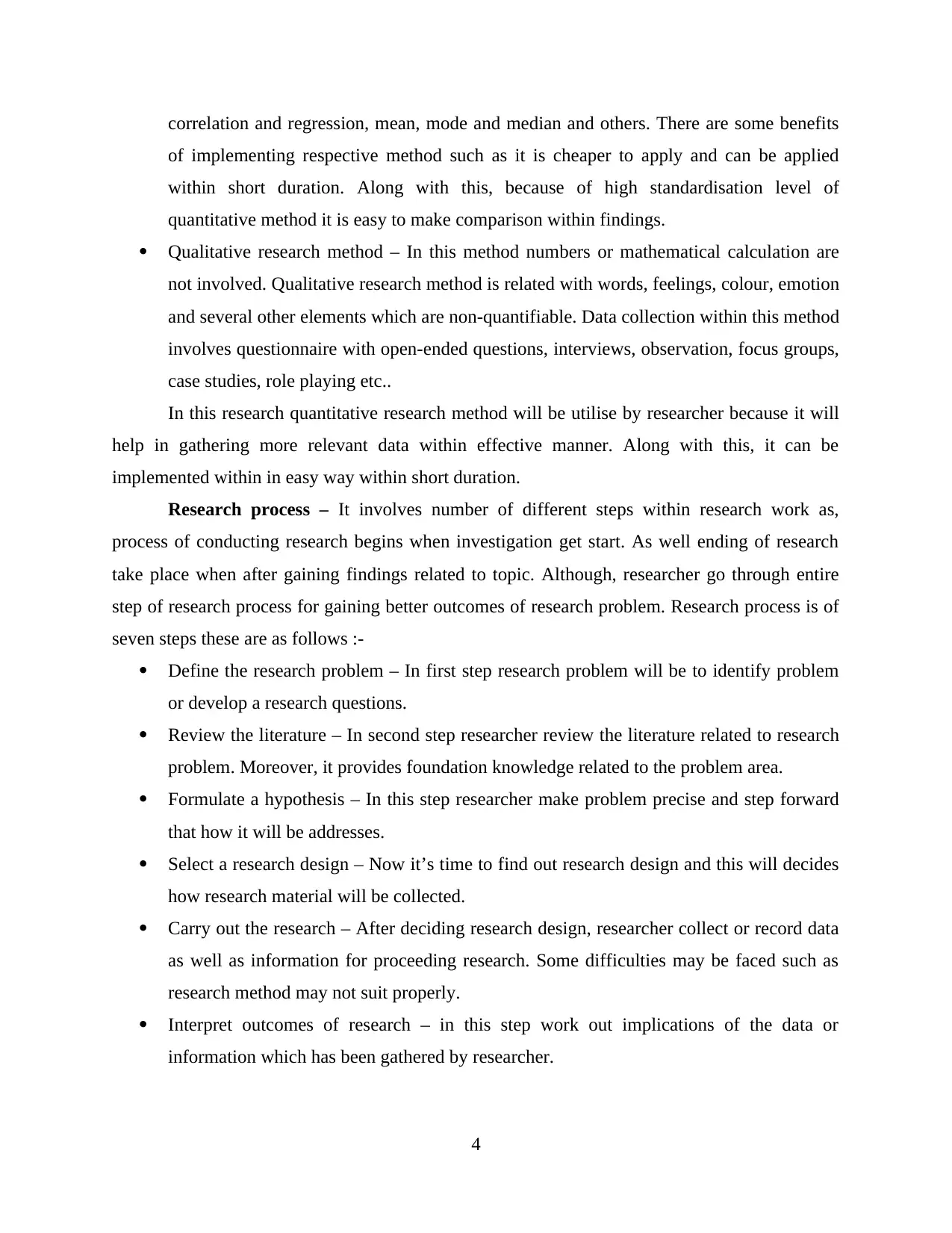
correlation and regression, mean, mode and median and others. There are some benefits
of implementing respective method such as it is cheaper to apply and can be applied
within short duration. Along with this, because of high standardisation level of
quantitative method it is easy to make comparison within findings.
Qualitative research method – In this method numbers or mathematical calculation are
not involved. Qualitative research method is related with words, feelings, colour, emotion
and several other elements which are non-quantifiable. Data collection within this method
involves questionnaire with open-ended questions, interviews, observation, focus groups,
case studies, role playing etc..
In this research quantitative research method will be utilise by researcher because it will
help in gathering more relevant data within effective manner. Along with this, it can be
implemented within in easy way within short duration.
Research process – It involves number of different steps within research work as,
process of conducting research begins when investigation get start. As well ending of research
take place when after gaining findings related to topic. Although, researcher go through entire
step of research process for gaining better outcomes of research problem. Research process is of
seven steps these are as follows :-
Define the research problem – In first step research problem will be to identify problem
or develop a research questions.
Review the literature – In second step researcher review the literature related to research
problem. Moreover, it provides foundation knowledge related to the problem area.
Formulate a hypothesis – In this step researcher make problem precise and step forward
that how it will be addresses.
Select a research design – Now it’s time to find out research design and this will decides
how research material will be collected.
Carry out the research – After deciding research design, researcher collect or record data
as well as information for proceeding research. Some difficulties may be faced such as
research method may not suit properly.
Interpret outcomes of research – in this step work out implications of the data or
information which has been gathered by researcher.
4
of implementing respective method such as it is cheaper to apply and can be applied
within short duration. Along with this, because of high standardisation level of
quantitative method it is easy to make comparison within findings.
Qualitative research method – In this method numbers or mathematical calculation are
not involved. Qualitative research method is related with words, feelings, colour, emotion
and several other elements which are non-quantifiable. Data collection within this method
involves questionnaire with open-ended questions, interviews, observation, focus groups,
case studies, role playing etc..
In this research quantitative research method will be utilise by researcher because it will
help in gathering more relevant data within effective manner. Along with this, it can be
implemented within in easy way within short duration.
Research process – It involves number of different steps within research work as,
process of conducting research begins when investigation get start. As well ending of research
take place when after gaining findings related to topic. Although, researcher go through entire
step of research process for gaining better outcomes of research problem. Research process is of
seven steps these are as follows :-
Define the research problem – In first step research problem will be to identify problem
or develop a research questions.
Review the literature – In second step researcher review the literature related to research
problem. Moreover, it provides foundation knowledge related to the problem area.
Formulate a hypothesis – In this step researcher make problem precise and step forward
that how it will be addresses.
Select a research design – Now it’s time to find out research design and this will decides
how research material will be collected.
Carry out the research – After deciding research design, researcher collect or record data
as well as information for proceeding research. Some difficulties may be faced such as
research method may not suit properly.
Interpret outcomes of research – in this step work out implications of the data or
information which has been gathered by researcher.
4
Paraphrase This Document
Need a fresh take? Get an instant paraphrase of this document with our AI Paraphraser
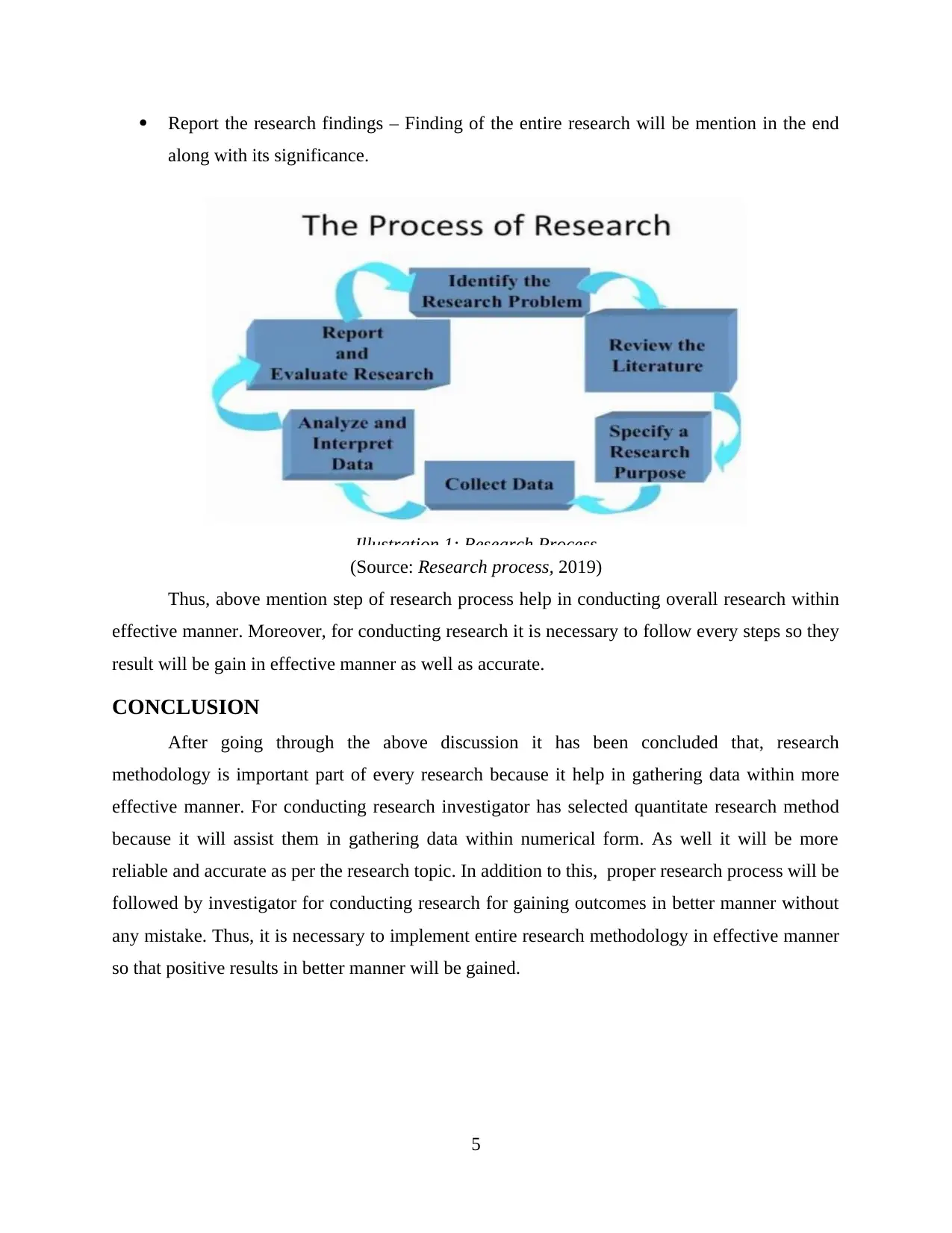
Report the research findings – Finding of the entire research will be mention in the end
along with its significance.
(Source: Research process, 2019)
Thus, above mention step of research process help in conducting overall research within
effective manner. Moreover, for conducting research it is necessary to follow every steps so they
result will be gain in effective manner as well as accurate.
CONCLUSION
After going through the above discussion it has been concluded that, research
methodology is important part of every research because it help in gathering data within more
effective manner. For conducting research investigator has selected quantitate research method
because it will assist them in gathering data within numerical form. As well it will be more
reliable and accurate as per the research topic. In addition to this, proper research process will be
followed by investigator for conducting research for gaining outcomes in better manner without
any mistake. Thus, it is necessary to implement entire research methodology in effective manner
so that positive results in better manner will be gained.
5
Illustration 1: Research Process
along with its significance.
(Source: Research process, 2019)
Thus, above mention step of research process help in conducting overall research within
effective manner. Moreover, for conducting research it is necessary to follow every steps so they
result will be gain in effective manner as well as accurate.
CONCLUSION
After going through the above discussion it has been concluded that, research
methodology is important part of every research because it help in gathering data within more
effective manner. For conducting research investigator has selected quantitate research method
because it will assist them in gathering data within numerical form. As well it will be more
reliable and accurate as per the research topic. In addition to this, proper research process will be
followed by investigator for conducting research for gaining outcomes in better manner without
any mistake. Thus, it is necessary to implement entire research methodology in effective manner
so that positive results in better manner will be gained.
5
Illustration 1: Research Process
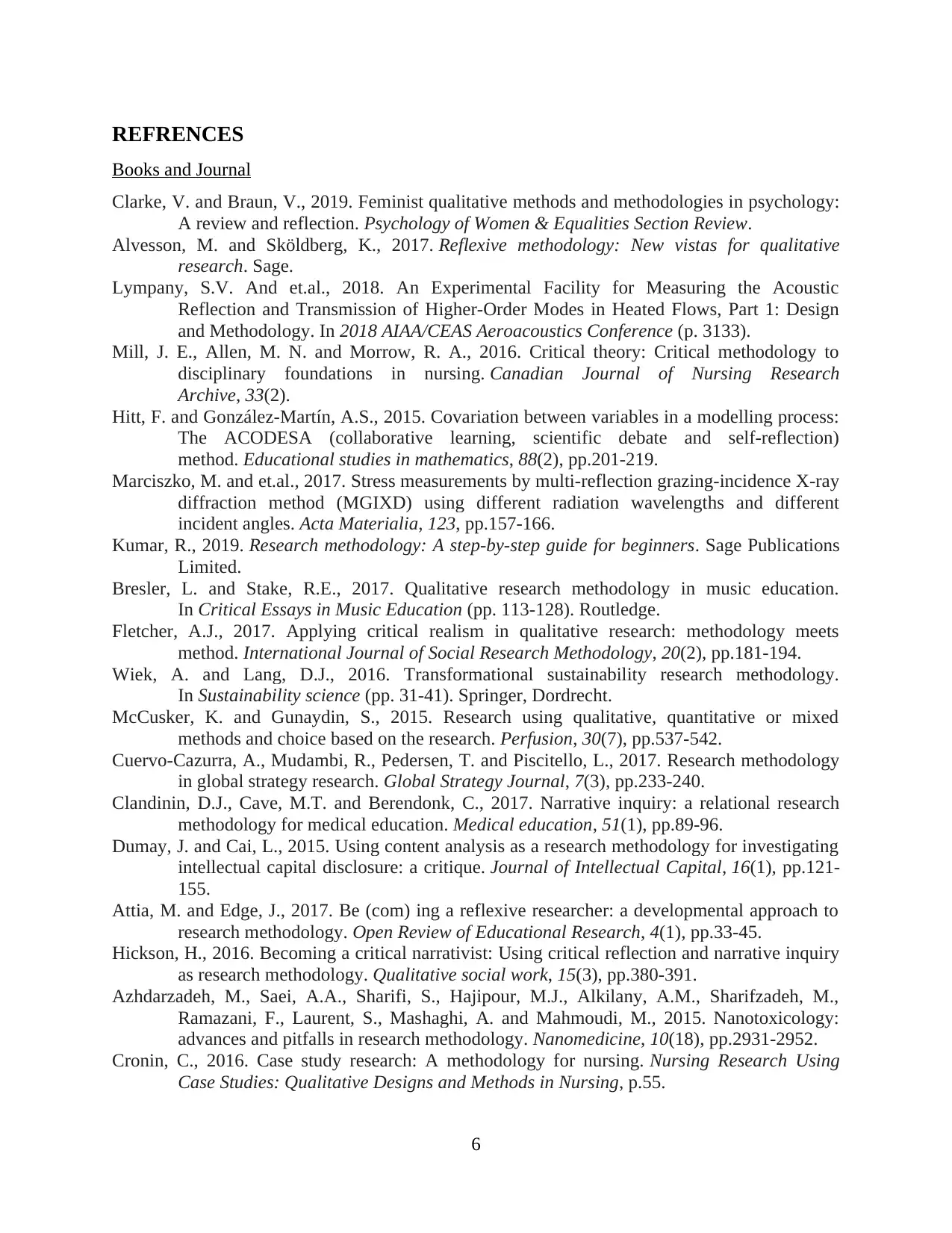
REFRENCES
Books and Journal
Clarke, V. and Braun, V., 2019. Feminist qualitative methods and methodologies in psychology:
A review and reflection. Psychology of Women & Equalities Section Review.
Alvesson, M. and Sköldberg, K., 2017. Reflexive methodology: New vistas for qualitative
research. Sage.
Lympany, S.V. And et.al., 2018. An Experimental Facility for Measuring the Acoustic
Reflection and Transmission of Higher-Order Modes in Heated Flows, Part 1: Design
and Methodology. In 2018 AIAA/CEAS Aeroacoustics Conference (p. 3133).
Mill, J. E., Allen, M. N. and Morrow, R. A., 2016. Critical theory: Critical methodology to
disciplinary foundations in nursing. Canadian Journal of Nursing Research
Archive, 33(2).
Hitt, F. and González-Martín, A.S., 2015. Covariation between variables in a modelling process:
The ACODESA (collaborative learning, scientific debate and self-reflection)
method. Educational studies in mathematics, 88(2), pp.201-219.
Marciszko, M. and et.al., 2017. Stress measurements by multi-reflection grazing-incidence X-ray
diffraction method (MGIXD) using different radiation wavelengths and different
incident angles. Acta Materialia, 123, pp.157-166.
Kumar, R., 2019. Research methodology: A step-by-step guide for beginners. Sage Publications
Limited.
Bresler, L. and Stake, R.E., 2017. Qualitative research methodology in music education.
In Critical Essays in Music Education (pp. 113-128). Routledge.
Fletcher, A.J., 2017. Applying critical realism in qualitative research: methodology meets
method. International Journal of Social Research Methodology, 20(2), pp.181-194.
Wiek, A. and Lang, D.J., 2016. Transformational sustainability research methodology.
In Sustainability science (pp. 31-41). Springer, Dordrecht.
McCusker, K. and Gunaydin, S., 2015. Research using qualitative, quantitative or mixed
methods and choice based on the research. Perfusion, 30(7), pp.537-542.
Cuervo‐Cazurra, A., Mudambi, R., Pedersen, T. and Piscitello, L., 2017. Research methodology
in global strategy research. Global Strategy Journal, 7(3), pp.233-240.
Clandinin, D.J., Cave, M.T. and Berendonk, C., 2017. Narrative inquiry: a relational research
methodology for medical education. Medical education, 51(1), pp.89-96.
Dumay, J. and Cai, L., 2015. Using content analysis as a research methodology for investigating
intellectual capital disclosure: a critique. Journal of Intellectual Capital, 16(1), pp.121-
155.
Attia, M. and Edge, J., 2017. Be (com) ing a reflexive researcher: a developmental approach to
research methodology. Open Review of Educational Research, 4(1), pp.33-45.
Hickson, H., 2016. Becoming a critical narrativist: Using critical reflection and narrative inquiry
as research methodology. Qualitative social work, 15(3), pp.380-391.
Azhdarzadeh, M., Saei, A.A., Sharifi, S., Hajipour, M.J., Alkilany, A.M., Sharifzadeh, M.,
Ramazani, F., Laurent, S., Mashaghi, A. and Mahmoudi, M., 2015. Nanotoxicology:
advances and pitfalls in research methodology. Nanomedicine, 10(18), pp.2931-2952.
Cronin, C., 2016. Case study research: A methodology for nursing. Nursing Research Using
Case Studies: Qualitative Designs and Methods in Nursing, p.55.
6
Books and Journal
Clarke, V. and Braun, V., 2019. Feminist qualitative methods and methodologies in psychology:
A review and reflection. Psychology of Women & Equalities Section Review.
Alvesson, M. and Sköldberg, K., 2017. Reflexive methodology: New vistas for qualitative
research. Sage.
Lympany, S.V. And et.al., 2018. An Experimental Facility for Measuring the Acoustic
Reflection and Transmission of Higher-Order Modes in Heated Flows, Part 1: Design
and Methodology. In 2018 AIAA/CEAS Aeroacoustics Conference (p. 3133).
Mill, J. E., Allen, M. N. and Morrow, R. A., 2016. Critical theory: Critical methodology to
disciplinary foundations in nursing. Canadian Journal of Nursing Research
Archive, 33(2).
Hitt, F. and González-Martín, A.S., 2015. Covariation between variables in a modelling process:
The ACODESA (collaborative learning, scientific debate and self-reflection)
method. Educational studies in mathematics, 88(2), pp.201-219.
Marciszko, M. and et.al., 2017. Stress measurements by multi-reflection grazing-incidence X-ray
diffraction method (MGIXD) using different radiation wavelengths and different
incident angles. Acta Materialia, 123, pp.157-166.
Kumar, R., 2019. Research methodology: A step-by-step guide for beginners. Sage Publications
Limited.
Bresler, L. and Stake, R.E., 2017. Qualitative research methodology in music education.
In Critical Essays in Music Education (pp. 113-128). Routledge.
Fletcher, A.J., 2017. Applying critical realism in qualitative research: methodology meets
method. International Journal of Social Research Methodology, 20(2), pp.181-194.
Wiek, A. and Lang, D.J., 2016. Transformational sustainability research methodology.
In Sustainability science (pp. 31-41). Springer, Dordrecht.
McCusker, K. and Gunaydin, S., 2015. Research using qualitative, quantitative or mixed
methods and choice based on the research. Perfusion, 30(7), pp.537-542.
Cuervo‐Cazurra, A., Mudambi, R., Pedersen, T. and Piscitello, L., 2017. Research methodology
in global strategy research. Global Strategy Journal, 7(3), pp.233-240.
Clandinin, D.J., Cave, M.T. and Berendonk, C., 2017. Narrative inquiry: a relational research
methodology for medical education. Medical education, 51(1), pp.89-96.
Dumay, J. and Cai, L., 2015. Using content analysis as a research methodology for investigating
intellectual capital disclosure: a critique. Journal of Intellectual Capital, 16(1), pp.121-
155.
Attia, M. and Edge, J., 2017. Be (com) ing a reflexive researcher: a developmental approach to
research methodology. Open Review of Educational Research, 4(1), pp.33-45.
Hickson, H., 2016. Becoming a critical narrativist: Using critical reflection and narrative inquiry
as research methodology. Qualitative social work, 15(3), pp.380-391.
Azhdarzadeh, M., Saei, A.A., Sharifi, S., Hajipour, M.J., Alkilany, A.M., Sharifzadeh, M.,
Ramazani, F., Laurent, S., Mashaghi, A. and Mahmoudi, M., 2015. Nanotoxicology:
advances and pitfalls in research methodology. Nanomedicine, 10(18), pp.2931-2952.
Cronin, C., 2016. Case study research: A methodology for nursing. Nursing Research Using
Case Studies: Qualitative Designs and Methods in Nursing, p.55.
6
⊘ This is a preview!⊘
Do you want full access?
Subscribe today to unlock all pages.

Trusted by 1+ million students worldwide
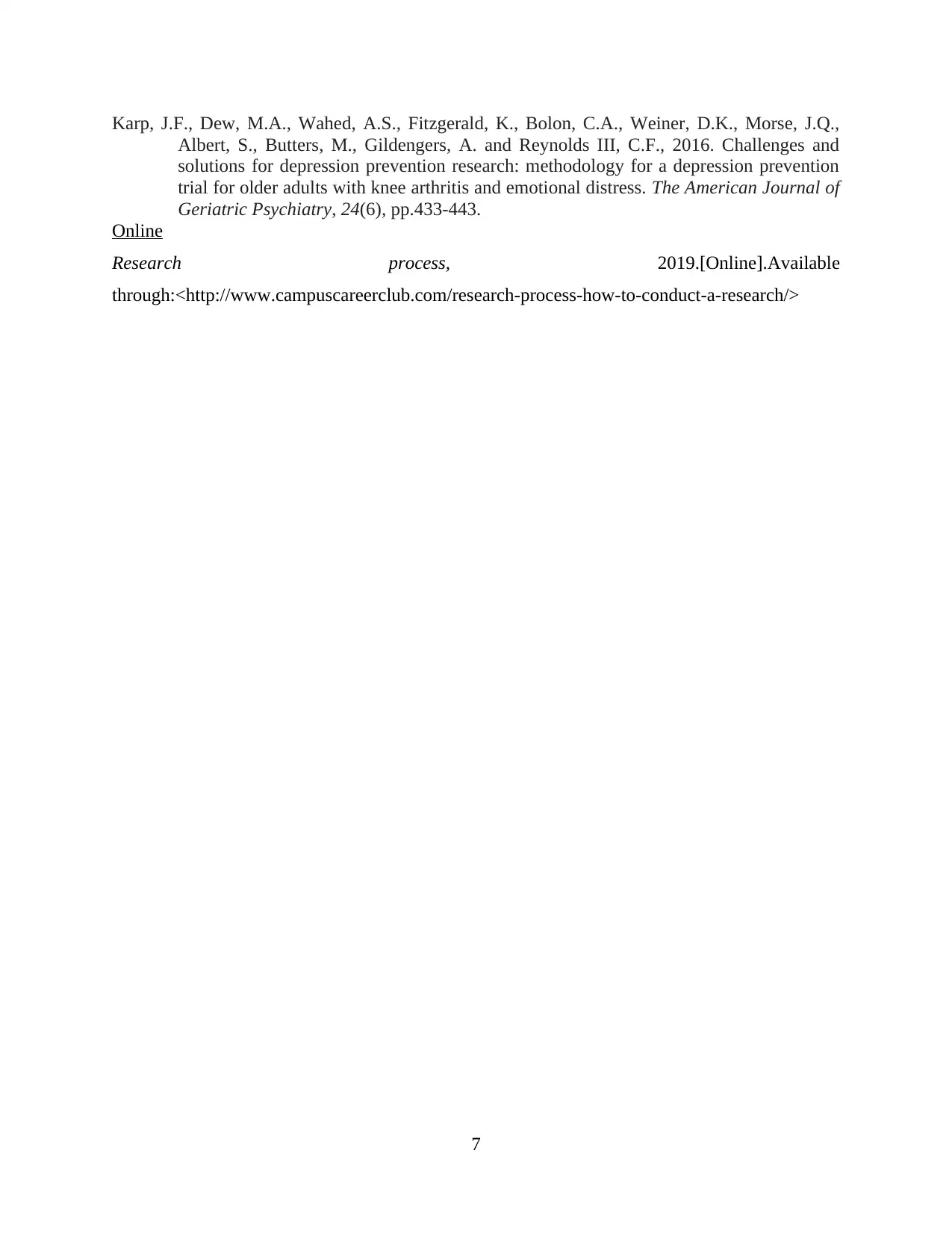
Karp, J.F., Dew, M.A., Wahed, A.S., Fitzgerald, K., Bolon, C.A., Weiner, D.K., Morse, J.Q.,
Albert, S., Butters, M., Gildengers, A. and Reynolds III, C.F., 2016. Challenges and
solutions for depression prevention research: methodology for a depression prevention
trial for older adults with knee arthritis and emotional distress. The American Journal of
Geriatric Psychiatry, 24(6), pp.433-443.
Online
Research process, 2019.[Online].Available
through:<http://www.campuscareerclub.com/research-process-how-to-conduct-a-research/>
7
Albert, S., Butters, M., Gildengers, A. and Reynolds III, C.F., 2016. Challenges and
solutions for depression prevention research: methodology for a depression prevention
trial for older adults with knee arthritis and emotional distress. The American Journal of
Geriatric Psychiatry, 24(6), pp.433-443.
Online
Research process, 2019.[Online].Available
through:<http://www.campuscareerclub.com/research-process-how-to-conduct-a-research/>
7
1 out of 10
Related Documents
Your All-in-One AI-Powered Toolkit for Academic Success.
+13062052269
info@desklib.com
Available 24*7 on WhatsApp / Email
![[object Object]](/_next/static/media/star-bottom.7253800d.svg)
Unlock your academic potential
Copyright © 2020–2025 A2Z Services. All Rights Reserved. Developed and managed by ZUCOL.





